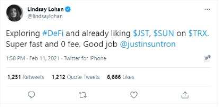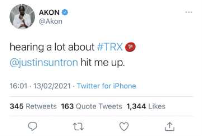The SEC Targets Celebrities for Nondisclosure of Crypto Promotions
On March 22, 2023, the U.S. Securities and Exchange Commission (“SEC”) announced charges against crypto asset entrepreneur Justin Sun and three of his companies—Tron Foundation Limited, BitTorrent Foundation Ltd., and Rainberry Inc. (formerly BitTorrent), for the unregistered offer and sale of crypto asset securities Tronix (TRX) and BitTorrent (BTT). According to the SEC, Sun is currently the Permanent Representative of Grenada to the World Trade Organization and is believed to be living in Singapore and/or Hong Kong. The SEC charged Sun and his companies by filing a complaint in the U.S. District Court for the Southern District of New York for fraudulently manipulating the secondary market for TRX through extensive wash trading, and for orchestrating a scheme to pay celebrities to tout TRX and BTT.
However, what grabbed media attention was the SEC simultaneously charged eight celebrities for illegally touting TRX and/or BTT without disclosing they were compensated for doing so and the amount of their compensation. These include: actress Lindsay Lohan; Youtuber and social media personality Jake Paul; rapper DeAndre Cortez Way a/k/a “Soulja Boy;” singer Austin Mahone; adult film actress Michele Mason a/k/a “Kendra Lust;” rapper Miles Parks McCollum a/k/a “Lil Yachty;” rapper Shaffer Smith a/k/a “Ne-Yo;” and rapper Aliaune Thiam a/k/a “Akon.” With the exception of “Soulja Boy” and Mahone, the celebrities settled their SEC charges and agreed to pay a total of more than $400,000 in disgorgement, interest, and penalties, without admitting or denying the SEC’s findings.
Sun, Tronix, and BitTorrent
The SEC’s complaint alleges that Sun and his companies offered and sold TRX and BTT as investments through multiple unregistered “bounty programs,” which directed interested parties to promote the tokens on social media, join and recruit others to Tron-affiliated Telegram and Discord channels, and create BitTorrent accounts in exchange for TRX and BTT distributions. The complaint further alleges that Sun, BitTorrent Foundation, and Rainberry offered and sold BTT in unregistered monthly airdrops to investors, who purchased and held TRX in Tron wallets or on participating crypto asset trading platforms. According to the SEC, each of these unregistered offers and sales violated Section 5 of the Securities Act. The SEC also alleges that Sun violated the antifraud and market manipulation provisions of the federal securities laws by orchestrating a scheme to artificially inflate the apparent trading volume of TRX in the secondary market. From at least April 2018 through February 2019, Sun allegedly directed his employees to engage in more than 600,000 wash trades of TRX between two crypto asset trading platform accounts he controlled, with between 4.5 million and 7.4 million TRX wash traded daily. This scheme required a significant supply of TRX, which Sun allegedly provided. As alleged by the SEC, Sun also sold TRX into the secondary market, generating proceeds of $31 million from illegal, unregistered offers and sales of the token.
Celebrity Endorsements
The SEC alleges that Sun induced investors to purchase TRX and BTT by orchestrating a promotional campaign. Sun allegedly paid these celebrities—each with millions of social media followers—to tout the unregistered offerings, while not disclosing they were compensated for doing so and the amount of their compensation. Surprisingly, the amount these celebrities were paid for their tweets, often in crypto assets and not cash, is relatively low. Lohan was paid $10,000; Paul was paid in crypto assets valued at approximately $25,019; Mason was paid $955; McCollum was paid $10,000; Smith was paid in crypto assets valued at approximately $12,000; and Thiam was paid in crypto assets valued at approximately $42,000.
In exchange for receiving compensation the celebrities promoted the following tweets:






The celebrities were specifically charged with violating Section 17(b) of the Securities Act by touting the token offering on their Twitter accounts without disclosing that they each received compensation from the issuer for doing so, and the amount of the consideration. Section 17(b) of the Securities Act makes it unlawful for any person to: publish, give publicity to, or circulate any notice, circular, advertisement, newspaper, article, letter, investment service, or communication which, though not purporting to offer a security for sale, describes such security for a consideration received or to be received, directly or indirectly, from an issuer, underwriter, or dealer, without fully disclosing the receipt, whether past or prospective, of such consideration and the amount thereof. See 15 U.S.C. § 77q(b).
The SEC previously warned in its July 25, 2017, DAO Report of Investigation that digital tokens or coins offered and sold may be securities, and those who offer and sell securities in the United States must comply with the federal securities laws.[1] The promotion also occurred nearly four years after the SEC’s Commission’s Division of Enforcement and Office of Compliance Inspections and Examinations issued a statement reminding market participants that “[a]ny celebrity or other individual who promotes a virtual token or coin that is a security must disclose the nature, scope, and amount of compensation received in exchange for the promotion. A failure to disclose this information is a violation of the anti-touting provisions of the federal securities laws.”[2]
Celebrities endorsing cryptocurrencies without disclosing compensation has been an ongoing trend in recent years. Celebrities offer legitimacy to the often volatile and niche world of cryptocurrencies. In October 2022, the SEC fined Kim Kardashian more than $1 million for Section 17(b) violations for promoting crypto assets on her Instagram. In 2020 the SEC previously brought Section 17(b) charges against actor Steven Seagal, and in 2018 against boxer Floyd Mayweather and music personality DJ Khaled.
Conclusion
Celebrity endorsements are nothing new. We are bombarded with endorsements on television and social media on a daily basis. However, promoting a sports drink is different than promoting a security. The latter, being a much riskier purchase to the consumer. Celebrities touting unregistered securities offerings while concealing their compensation is the very conduct the federal securities laws were intended to safeguard—promoting transparency and disclosure so that investors can make a fully informed decision and know that the promoter is getting paid for the claims he or she makes. As cryptocurrency investment becomes more mainstream, the SEC has shown their willingness to aggressively enforce Section 17(b) violations and go after those celebrities who fail to comply with the securities laws. This not only makes for good public policy but also acts as a deterrent for future celebrities who may be tempted with a quick cash grab to tweet or post about a crypto asset. The SEC’s recent enforcement action stands as a warning to celebrities that they should probably consult with legal counsel versed in the securities laws before promoting or endorsing any cryptocurrencies.
Lowey Dannenberg has a 50+ year track record of successfully representing investors in numerous asset classes who are defrauded. If you wish to speak to a member of Lowey Dannenberg’s securities and financial litigation practice groups, please feel free to reach out to Christian Levis (clevis@lowey.com), Andrea Farah (afarah@lowey.com) or Anthony M. Christina (achristina@lowey.com).
[1] Report of Investigation Pursuant to Section 21(a) of the Securities Exchange Act of 1934: The DAO, Exchange Act Rel. No. 81207 (July 25, 2017).
[2] See SEC Staff Statement Urging Caution Around Celebrity Backed ICOs (Nov. 1, 2017), available at https://www.sec.gov/news/public-statement/statement-potentially-unlawful- promotion-icos.
